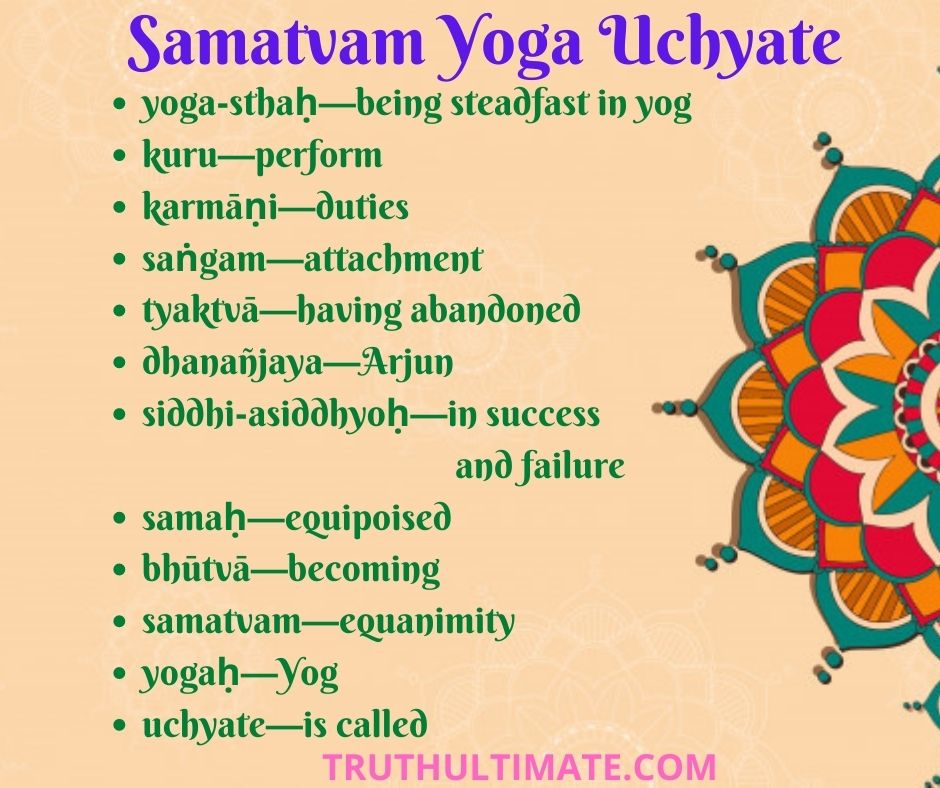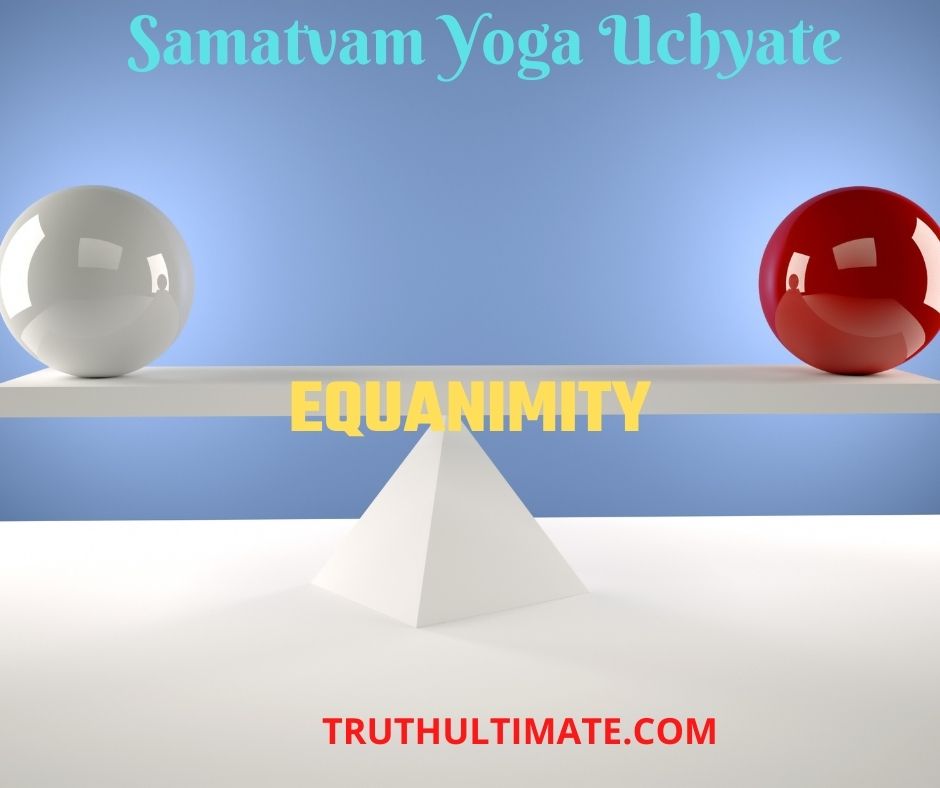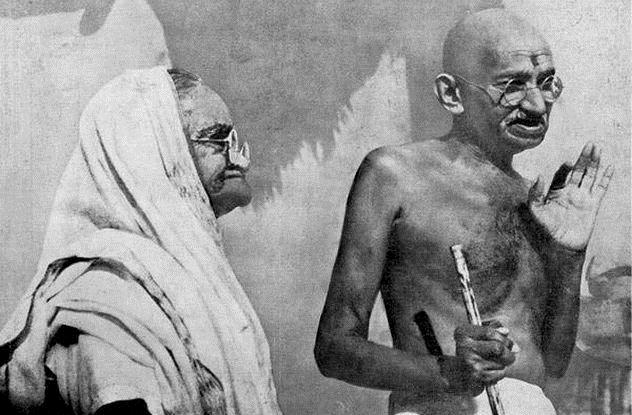Samatvam Yoga Uchyate-this great verse of the holy epic Bhagavad Gita depicts the key sutras to the entire humanity. The verse teaches and explains the truthful interpretation of Yoga and how to be established in the state of “Yoga”.

Samatvam Yoga Uchyate is beautifully interpreted as “Equanimity is Yoga” which has in-depth spiritual and pragmatic importance for humanity.
Samatvam Yoga Uchyate Sanskrit
योगस्थ: कुरु कर्माणि सङ्गं त्यक्त्वा धनञ्जय |
सिद्ध्यसिद्ध्यो: समो भूत्वा समत्वं योग उच्यते ||
This is what we find in Bhagavad Gita in Sanskrit. And, if you find it difficult reading Sanskrit, we have sorted it for you as well.

yoga-sthaḥ kuru karmāṇi saṅgaṁ tyaktvā dhanañjaya
siddhy-asiddhyoḥ samo bhūtvā samatvaṁ yoga uchyate
Samatvam Yoga Uchyate is in the last verse of this Sloka as you can see above.
Samatvam Yoga Uchyate Pronunciation
If we break the verse Samatvam Yoga Uchyate in words, you can then pronounce it easily.
Samatvam can be pronounced as Samat-vam. While Yoga can be pronounced as “Yog-a and the “a” in the verse will be pronounced in a short sound. And, Uchyate can be pronounced as Uch-yay-tay. The “ya” is pronounced as “yay” and “te” is pronounced as “tay”.
Samatvam Yoga Uchyate Meaning
Literally, Samatvam Yoga Uchyate means that “Equanimity is Yoga”. And, the whole sloka means, “Be steadfast in the performance of your duty, O Arjun, abandoning attachment to success and failure. Such equanimity is called Yoga.”
Here are the literal meanings of the whole sloka where Shree Krishna says this to Arjun.
- yoga-sthaḥ—being steadfast in yog
- kuru—perform
- karmāṇi—duties
- saṅgam—attachment
- tyaktvā—having abandoned
- dhanañjaya—Arjun
- siddhi-asiddhyoḥ—in success and failure
- samaḥ—equipoised
- bhūtvā—becoming
- samatvam—equanimity
- yogaḥ—Yog
- uchyate—is called

Samatva comes from the Sanskrit root word ‘sama’ which means ‘equal or even’ and ‘tva’ is a suffix meaning ‘ness’. This word alone holds a very primary place in Bhagavad-gita where it means ‘even-mindedness’. And, Yoga is dependent on this even-mindedness.
The equanimity enables us to accept all the circumstances that life throws at us and that too with serenity. And, this action of ours is so noble and praiseworthy near Lord Krishna that he calls it“yoga” or in other words a union with the supreme. This equilibrium and balance occur only if we follow and implements the teachings of the previous verse. When we will start understanding that the effort is in our hands, not the result so we will automatically concern ourselves only with doing our duty.

The results that we achieve are to please God and we should dedicate our results to him only. Now, if the results are not up to our expectations, we still should calmly accept them considering them as the will of God. And, this way we will able to accept fame and infamy, success and failure, pleasure and pain, or what is there for us as God’s will. When we learn to embrace both equally, we will develop that feeling of equanimity that Lord Krishna talks about in the sloka.
This verse is the practical solution to the unpleasant circumstances of our life. Like, if you sail in a boat, you naturally expect it to shake because of the waves of the ocean. And, if we start getting disturbed each time the waves shake the boat, our miseries in life will be endless. And if you don’t expect the waves to shake the boat, you are actually expecting it to be something other than the natural self.

Waves are inseparable phenomena of the ocean and you should expect them to react the way in their natural way. Similarly, our life is exactly the relation as the ocean, waves, and boats. Life throws up all kinds of waves that are beyond our control. And, if you keep struggling to eliminate negative situations in life, you will be unable to avoid unhappiness. If you learn to accept everything that comes your way and that too without sacrificing your best efforts and will surrender to the will of God, it will be true ‘Yoga’.
In short, Lord Krisna gives Yoga another definition by explaining Samatvam or equanimity as Yoga. You can summarize the whole proverb as “the balanced state of mind is Yoga”. Yoga itself is a balanced state, “A balanced state of body and mind” both. Yoga is basically a balanced state of emotions, a balanced state of behavior, and a balanced state of thought and intellect.

Furthermore; it is the art of equilibrium in life. We become excited when something good happens in our life or when it is a situation of pleasure. On the other hand, in negative conditions and circumstances, the feeling of sadness automatically comes. Yoga teaches you how to maintain the equilibrium of mind in any situation. And, equanimity or the balanced state of mind is the key objective and goal of Yoga.
What is the meaning of Samatvam?
Samatvam basically means equanimity. And, this verse refers to the ability to keep the mind steady and balanced in all the conditions of life. In some sense, it enables you to be forever serene, calm, contented, and peaceful. Basically, Samatvam is having the ability to be cheerful even in adverse conditions.
This enables you to have fortitude in meeting danger and to have the presence of mind and forbearance to bear insult, injury, and persecution. Moreover, it means to be able to go through the tough and hectic routine of life, amidst the din and clamor of the world, that too patiently and joyfully.

It is that yoga that Lord Krishna talks about it in detail in the holy book of Bhagavad Gita. Shree Krishna regards Samatvam as that evenness of mind which a true yogi owns amidst the worst of all turmoil, difficulties, and calamities. It leads you to a state wherein all the mental thoughts, imaginations, modifications, moods, impulses, emotions, and instincts are transcended.
Furthermore, Lord Krishna explains that samatvam actually means the ability to maintain one’s balance of mind in success and failure, gain and loss, or pleasure and pain. And, this is the aptitude of a perfect master who keeps his actions and behavior equipoise in all circumstances. Even, in the Jainism community, the practice of samatva is considered a sadhana which is a spiritual practice in itself. It is found in the scriptures and according to the scripture Bhagavatisutra (9.386)- “the nature of the soul is equanimity”.
The definition of Samatvam is more than what you think. It goes far beyond the temporary condition of mental quietude that people often speak about when they retire for a short time to a Himalayan hermitage, Alps, or to any quiet nature reserve for a little rest when they are tired after a long journey. Moreover, it is the attainment of absolute peace and tranquility of the highest nature.

Samatvam is the realm of serenity where all the cares, worries, anxieties, and fears which torment our soul do not dare to enter. It’s the ream of eternal sunshine where all your worldly distinctions of caste, creed, and color disappear in the warm embrace of divine love. It’s the safe place where all your desires and cravings have found their full satiety.
Our modern world is all restless, and with time, we are adding more stresses and tensions to our life. Everyone in this world is restless, and all of us are striving after something. But, what all of us don’t know. We all always feel that we are in the need of something, the nature of which we can’t comprehend. We get degrees, diplomas, names, titles, honor, powers, and fame.

We all marry and then beget children. In short, we all get what we suppose would give us happiness and strive for it. A person may possess immense wealth and all sorts of comforts and easy going life, yet he may not have peace and happiness in his life. A person doesn’t have inner peace, despite having all the richness of the modern world because he doesn’t have any harmony.
There is discord in the person’s heart because of selfishness, greed, egoism, lust, pride, fear, hatred, anger, and worry. The person may find worldly greatness and even when secured, is all a delusion and a snare, and finds no peace or happiness in it. The outward harmony and quietness don’t mean you can have inner peace and harmony. Just because everything in society is all well, it doesn’t guarantee peace of mind.
Samatvam Yoga Uchyate Bhagvad Gita
Bhagavad Gita is although very easy to understand and contains the basic principles of life. The sloka we explained is a part of Bhagavad Gita, Chapter 2 and Verse 48.

It is basically a saying of Lord Shree Krishna which he was telling to Arjun. As we already discussed the Sanskrit in Bhagavad Gita, here is the English translation of this verse for those who strive to learn more about the verse.
English Translation:
Perform action, established in yoga, and discard attachment, O Dhananjaya. Remain balanced in success and failure. Yoga is defined as equanimity.
-Verse 48, Chapter 2
Samatvam Yoga Uchyate Art of living
Samatvam Yoga Uchyate is basically the art of living. Because, being calm and peaceful when life is all good is easy, but being calm and peaceful when life gives you lemon is quite a task. Peace and calmness have value when it’s done when life is falling apart. Calmness is needed the most, and wisdom is most valuable when there is chaos and confusion and when there are problems all around you.

As an example, when people blame you and they fail to understand you, that’s where you need the inner strength to smile. When things are not going the way you don’t expect them to be, that is exactly where you need endurance, strength, and courage to remain unperturbed. And, what brings the courage in you to face all these things is what exactly Lord Krishna talked about. And, this art of balance is the test of your yoga. Yoga cannot be possible if you don’t possess even-mindedness.
This Samatvam Yoga Uchyate has been the art of living of the great leaders in history as well. When Kasturba Gandhi, the life partner of Mahatma Gandhi was on her deathbed and doctors had given up hope and they said “it’s only a few hours or minutes- that’s it- for her to live”.

That’s when Mahatama Gandhi gained up the courage and came out of his Kutir and asked Pandit Sudhakar Chaturvedi, to read that verse from Gita to me. When he recited the Gita, Gandhiji responded, “Today is your Bapu’s test. Today is my examination. I will know whether I will be able to handle the loss of Kasturba.” When he can be calm in these hard circumstances, we can also learn some bits from him. And, yoga brings that balance in your life, so that the events don’t shatter you from inside.
This old verse Samatvam Yoga Uchyate is still relevant in this modern world. In this proverb, Krishna tells Arjuna that he should act in yoga. Samatvam Yoga Uchyate pushes the teaching of Karmayoga further and advice us to begin discarding our attachments to objects in the material world.

Obviously, we cannot totally discard all our attachments in one day. And, this courage takes a lot of time. However, Lord Krishna asks us to slowly start walking on this path. And, why does he ask us to follow this path? It’s only because he wants us to diminish our hankering for the outcome of our actions. The only way to achieve that is by reducing our attachments to this material world.
A mother, who takes care of her child, extremely gets attached and develops a lot of expectations. There is automatically a feeling that this child will take care of me when he grows up. He will achieve something in life and become successful. And, if these things don’t happen she becomes disheartened and generates lots of sorrow for herself.
But, a nanny will not be attached to a child, and she will only perform her svadharma by taking good care of the child without any expectations. And, this way she maintains the equanimity. This is how we are supposed to react and we should detach ourselves from worldly things.
Then, in this sloka, we encounter the term yoga defined by Lord Krishna. The term yoga has nothing to do with arcane rituals and complex physical postures. It is only a simple and practical definition i.e. equanimity of mind during the performance of actions.
Now you might think about how we all achieve this? What are the practical techniques to cast off attachments from the material world? How are we actually supposed to achieve this art of living? But, we can and we have to. We have to get rid of ourselves from all expectations and worries about the future, and the memories of the past.

Once we eliminate constant thinking about past and future, we can then use all that energy into the present moment and into executing the task at hand. We all have experienced certain instances in our lives where we are so joyfully and blissfully involved in our work that we eventually forget where we are and what time it was.
But, these experiences are very few in our lives, it is not something we experience every day. And, by going deeper into these thoughts and each and every task we perform whether a big or small task we will be able to minimize past and future thinking that enables us to remain balanced regardless of the worries of success and failure.
When life gives you a challenge, that’s when all the skills of balance and equanimity are needed from you.
Just observe, just imagine, how your mind goes and how it flares up, in just the little things of life. Our mind creates mess all-around in almost the nothing or little matters of life. One moment our life is high, and one moment it’s down, and yoga is the answer to this psychological unrest that life has pushed us into.
Yoga brings even-mindedness and equanimity to our approach. It brings inner peace and calmness when the atmosphere around us is turbulent along with stabilizing the consciousness. So, we should learn to maintain the balance in our emotions and behaviors in all circumstances and moments.
To summarize this all, here are the things you need to detach yourselves in order to maintain equanimity and balance in life.

- reducing unnecessary thoughts
- improving quality of thought
- focusing on the task and hand
Try practicing this from the mundane matters of life; it will eventually take you to the big decision and circumstances of life. You should always start from the easy tasks and move onto complex ones. Next time, you start watering your plants, try to give undivided attention to this, and you will see the difference. Give it a try and see what happens and what it holds for you.
courtesy: google images
References:
https://www.holy-bhagavad-gita.org/chapter/2/verse/48
https://www.artofliving.org/us-en/how-yoga-can-help-maintain-your-calm-in-chaos





